April 17, 2025
I like the way the world waits for you
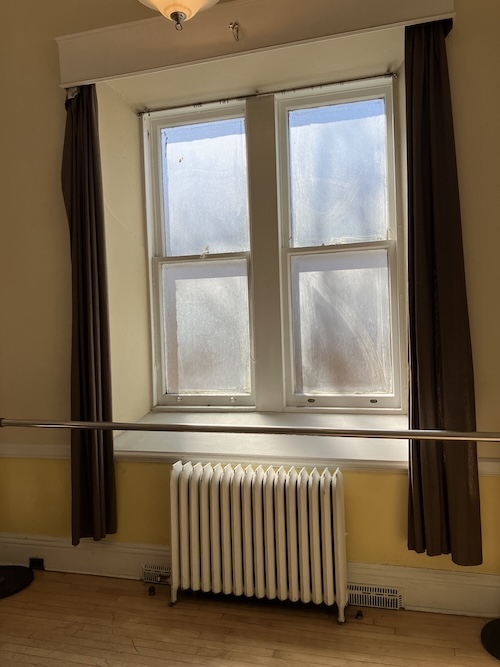
I’ve had a hard season, one whose heaviness I didn’t wholly recognize until the weight was gone. And throughout it all, my Thursday mornings with Singing Mamas have been one essential thing that kept me going, the sacredness of that space, the songs, that light. About three weeks ago, it occurred to me that this this was the first time I’d been attending the group and really felt genuinely joyous, as opposed to joy that was instead a brief respite from darkness and pain (which is not to say that such respite didn’t mean everything).
It’s curious to be showing up and know that I look the same, and that gorgeous light is just the same, and all those songs are just the same, but everything is different.
I like the way the world waits for you, that it’s possible to meet us where we’re at.
I’m very sleepy today after a later-than-usual night last night picking up my kid at her semi-formal, which happened to be her first school dance. She should have had her first school dance in 2021 as part of her Grade 6 graduation, and all such festivities were cancelled that year, along with so many other things, on account of the pandemic, and so it felt extra special that she had such a good time last night. Her younger sister is now the same age she was that year, when her class’s end of the year school trip was also cancelled (don’t worry—she’s had plenty of end-of-the-year trips since then!) and just yesterday we received the permission form for her sister’s trip, and it feels extra special to have this finally happening, the sort of thing I could possibly have been compelled to take for granted, but now I never will. We’re all so excited for her. (I feel like I’ll be tripping over pandemic losses and trauma for the rest of my forever.)
But still, I’m sleepy, and so when I went swimming today, I got in the medium lane and went so slow. Slow and easy, slow and easy, and I like this about swimming too, how it can meet you where you’re at. Just like the light in the room where we sing.
March 20, 2025
I Don’t Believe in Seeds
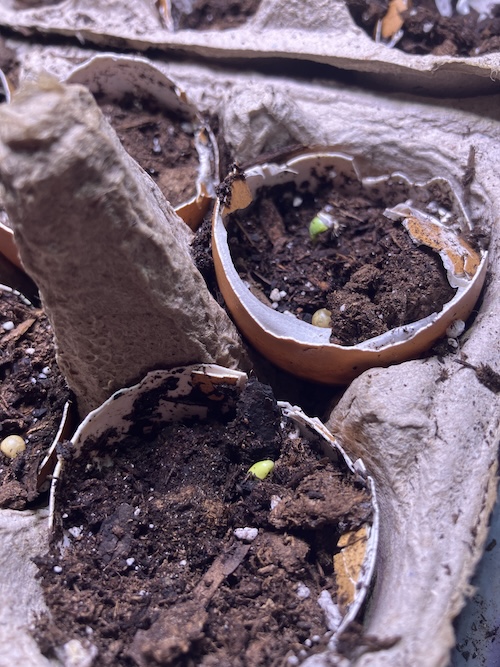
I don’t believe in seeds. I just can’t fathom the fact of what happens when you plant them, no matter how many times I’ve watched the miracle happen, which it always does, and it’s still never not blown my mind. That new life is possible*, how this can turn into that, the ordinary miracle. I still don’t believe it, I can’t. I mean, not so much that I don’t sow seeds every single spring, because I do, the most hopeful gesture I ever enact. I remember how counter-intuitive it felt to sow seeds in the darkness of March and April 2020, how beside-the-point, and even pointless, but I did it anyway, which felt daring and subversive in the depths of my anxiety, to imagine such a thing as a future. I like the hope and the promise therein, but I still don’t believe it, I never do.
Which means that when I do plant seeds, I go overboard. What are the odds, I consider, that a single seed is ever going to sprout? It’s a gamble, so I might as well sow five of them, maybe ten. What kind of magic is this, from a fairy tale, it seems like, spinning straw into gold, growing a single speck into a snapdragon, a gangling plant whose blooms I’ll be clipping until into November. To sow seeds is to take the long view, to have vision, to have faith, except I don’t, as we’ve established. Not really. Not enough that I can simply trust, instead hedging my bets, an entire handful of snapdragon seeds flung into the soil, because what if I was measured about it and then nothing happened?
Lately, I’ve been thinking a lot about faith, about notions of A faith, and about how useful and comforting it would be to have such a thing at this moment. To have a sense of the world and in justice and progress that had not completely been turned upside down and inside out, leaving me wondering if I really know the world at all, what I ever knew about people, and progress, and what the project of these lives we’re weaving together. I watch the world through my news feeds with terror and dread, so much grief and sadness, and I long for something firm to hold onto. I want to keep believing in people, and possibility, in this beautiful world and for our little place in it, and good things being possible.
But I guess that’s what faith is, when it’s hard to believe, but you do it anyway. When we sow those seeds, even when it seems impossible that they’ll ever turn into anything. And what if any doubt we have is a reason to chuck in a handful of seeds, instead of permission to give up sowing altogether?What if sowing seeds shows us that miracles happen all the time?
I woke up this morning, the first day of spring, to find that the seeds I’d planted on Sunday evening had already begun. After a beautiful morning singing songs of peace and joy, I came home and dove into edits on my fourth novel, which will be coming your way in a year less three days.**
I still don’t believe in seeds, and yet. Here we are.
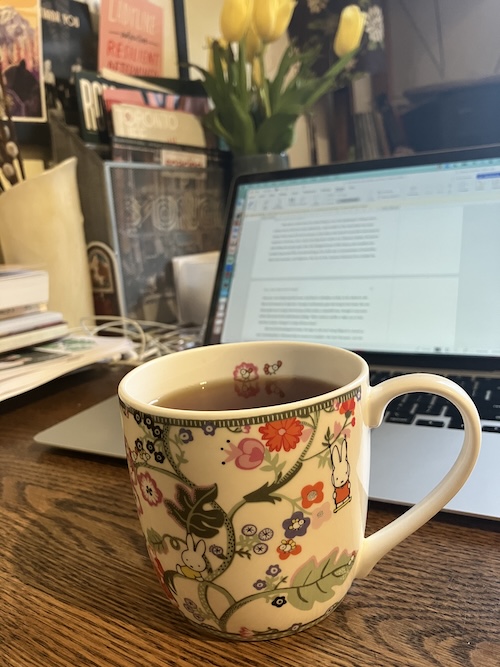
*Not unrelated: I also can’t believe that my children exist. Like, what even is up with that? Where did they come from and how do they just keep getting more and more magnificent all the time?
**Which is exactly five years TO THE DAY after I first wrote about the project: “Making: A new novel that’s inspired by Barbara Pym’s books, and I just hit 10,000 words. It might not be good, it might never be published, but my goodness, am I having a good time.”
May 10, 2024
Peacocks in Public
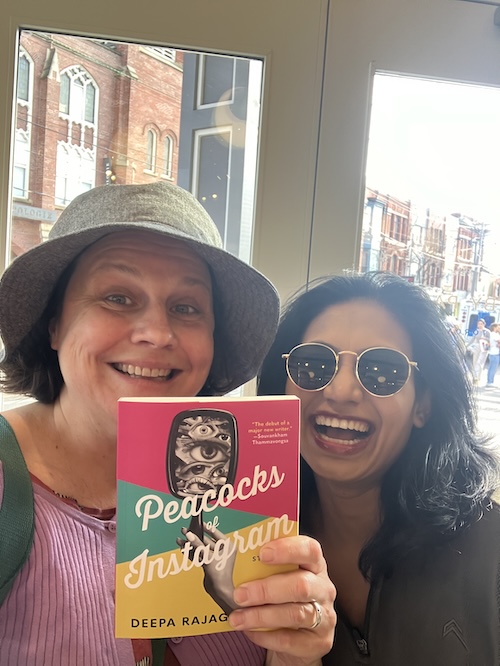
Raise your hand if you too are unable to resist the compulsion to stop any stranger in public you see reading or even just carrying a book you love in order to let them know—in case they didn’t already—JUST how good that book actually is.
But never before has the experience been quite as rich and rewarding as when I accosted @livingbyn_designs on Saturday night as she walked down Queen West bearing her newly purchased copy of PEACOCKS OF INSTAGRAM, a book that is not only THE best titled title of 2024, but also everything you’d hope a book with such a great title would be, as I found out in February when I read it for a podcast interview with its author, the talented @deerajagopalan (whose BOOKSPO episode goes up next week!).
The best thing about meeting Nila with her copy of PEACOCKS OF INSTAGRAM Is that she met all of my enthusiasm for this terrific book, and then even exceeded it, positively overflowing with pride and happiness at her friend having produced a book so terrific that strangers will stop you in the street to exalt its praises. I mean, JUST LOOK AT THE EXPRESSION ON HER FACE? Have you ever seen anything as awesome and real?
Our encounter was such a celebration of books and friendship and gorgeous summer nights, and it made me so happy, not least at seeing this book in the world for the very first time. Congratulations on your pub date, @deerajagopalan! I can’t wait to read PEACOCKS OF INSTAGRAM (again)!
(I posted this to Instagram this week, but wanted to add it to my blog for posterity!)
May 6, 2024
Light

I have a file in my head I’ve started calling the “Really Important to Understand Even if (ESPECIALLY IF?) You Don’t Agree” file, and the latest addition to it is Zadie Smith’s New Yorker essay “Shibboleth.” It joins Naomi Klein’s “We Need an Exodus from Zionism,” a speech she made in New York City last month at a Seder during Passover, and the essay “Resigned,” by Dashka Slater, which I think was the piece that started it all. Someone I admire a lot posted that essay, and the weird thing about that was the people who reacted to it with comments like, “This!” and “So good,” which didn’t seem entirely to be in keeping with the spirit of the piece, but maybe I just think that because of the parts of the piece that I didn’t agree with. And certainly I’ve posted similar responses to other things often in my time, particularly during the years when I was very on Twitter, and I have a visceral recollection of the relief of finally having someone articulate a reasonable point of view when everybody else seems to be infected with some kind of mania or fever dream, all those posts that felt like a lone thing to cling to in a chaotic world. THIS. THIS. But that kind of certainty isn’t what that I’m craving anymore.
Today, a bunch of people I really like on Facebook are sharing a piece called “50 Completely True Things,” a pretty unobjectionable piece (I might even comment, “This!”) but what bothers me about it and really makes me feel for its author, mo husseini (a Palestinian-American, who clearly is caught in a bind here and has issues that I can definitely relate to about people-pleasing and feeling like he’s required to mediate conflicts that he’s in no way I provoked [I’m not saying it’s the same, but I once published a literary anthology in an attempt to mediate The Mommy Wars]) is this requirement for unobjectionableness. (Not unrelated, but also in my file: Roxane Gay’s “The Age of the Open Letter Should End.”) The idea that such a thing is even possible.
It’s been a weird time, during which I’ve been admonished by people I don’t respect very much for both being an enemy of the Jewish people AND aiding and abetting Palestinian genocide with my silence. And funnily enough, people scolding me, yelling at me, or trying to shame me have not done a lot to enhance my point of view, and I’ve given up altogether at trying to persuade other people by doing the same, not just because the tactic is so ineffective, but also because I’ve become vehemently opposed to righteousness and self-righteousness, want nothing to do with either.
I keep thinking of that line from a book I read two weeks ago: “Wisdom is valuable. But the ability to find understanding is a gift that all creation enjoys… In some ways, you can think of wisdom of light. But it is understanding that carries the light. Understanding is what wisdom travels through.” (The author is Michael Hutchison, and it’s a line of dialogue delivered by a Cree Elder.)
Understanding carries the light. I don’t want to to change your point of view, but I seek to understand it, and I want you understand mine too, even if those points of view are different. ESPECIALLY if those points of view are different. There is room enough for complexity, and nuance, and I hope that with the light that comes with understanding, we can all feel braver and more secure, less defensive and afraid, that light not a beacon in the distance, but instead a shine that lights up everyone, everywhere. A kind of common ground.
April 29, 2024
On Being Chosen

I’ve had a very fun and action-packed couple of weeks literary-wise that continues with tomorrow’s trip to Waterloo to interview Iona Whishaw about her latest Lane Winslow book. And a highlight was Thursday’s Biblio Bash at the Toronto Reference Library, a gala event at which I was invited to be a guest author. I’d attended once before in 2017 when my first novel came out, and the whole experience was intense, awesome, very overwhelming—plus I got my makeup done at the drug store and told them the look I was going for was “very dramatic” and ended up resembling a drag queen, and I’m still traumatized, no offence to drag queens. This time I had the benefit of hindsight and hired someone excellent to do my makeup, plus I’m about 300 years older than I used to be (pandemic effect) which meant I behaved with aplomb, looked quite fantastic, and drank so little that I woke up in the morning without a hangover, but still had lots of fun. It was a very good night and the Toronto Public Library Foundation raised more than a million dollars.
But I was cognizant through the entire process too that a big part of the experience (and one of its chief appeals, beyond the stunning portraits) was the feeling of being chosen. An exclusive event, an opportunity to mingle with the fancy people and wear a floor length gown. And I’ve been reflecting on this a lot, how much of the reality of publishing is often about the experiences of being chosen, or otherwise. Finishing your book, signing with an agent, getting a book deal, getting an impressive book deal, a book deal with a big press, becoming a bestseller, sustaining bestsellerdom, continuing that success with your next book, winning prizes, getting reviewed in all the best places, being “picked” by Oprah, Heather, Reese or Jenna, and on and on and on. And even when you get chosen on one level, there are all kinds of tiers and ways to still feel like you’ve been chosen (or that you’re falling short) and it’s all so urgent and arbitrary and so little of it (as with most things) is actually within any of our own control. Who gets to matter, to be important, and the pressure—even if you happen to be one of the ones—of staying on top, remaining relevant.
And all of it—it’s excruciating. I spent most of last fall feeling like such a failure, my self-worth so undermined by my latest novel’s failure to launch in the way I had envisioned—and thinking into the future, in which I might no longer be able to publish books at all, to be once again un-chosen by a publisher, and on one level, the stakes are negligible here, life goes on, but on the other, this is my career, and the thought of failure is just devastating once one has built their entire sense of self around the identity of not just being a writer, but one of those rarest of cases—a successful one.
There is a line from the Dar Williams song, “As Cool as I Am“, that I think (ugh!) I’m going to continue to be reminded of for the rest of my life: “And then I go outside to join the others; I am the others.” (You can even get a t-shirt!). So much of my own yearning to be chosen, to be validated, is to be offered proof that I am special and have worth. And of course I am special and have worth, by virtue of my existence as a human being, just like you do, but how to deal with that desire for distinction, for proof that I am not merely one of the others—it’s something else I’m figuring out at the age of almost-45, along with how to look good at a gala.
To accept that I am the others is realize that my sense of value and self-worth is intrinsic, rather than extrinsic, and that often nobody else is going to be see it but me, which means that I really have to know it, or no one will.
To quote another line from “As Cool as I Am”: “Oh, and that’s not easy.”
It’s really not, it’s so much easier to be seen by others than to see our ourselves as we really are, warts and all, and not even just accept it, but hold that reality as something worthy and sacred. It’s so much easier to share a photo of myself looking stunning at an exclusive shindig and have hundreds of people LIKE it than to sit with myself and know that this is all I’ll ever be.
But I’m working on it, little by little, building up a solid core, something unimpeachable.
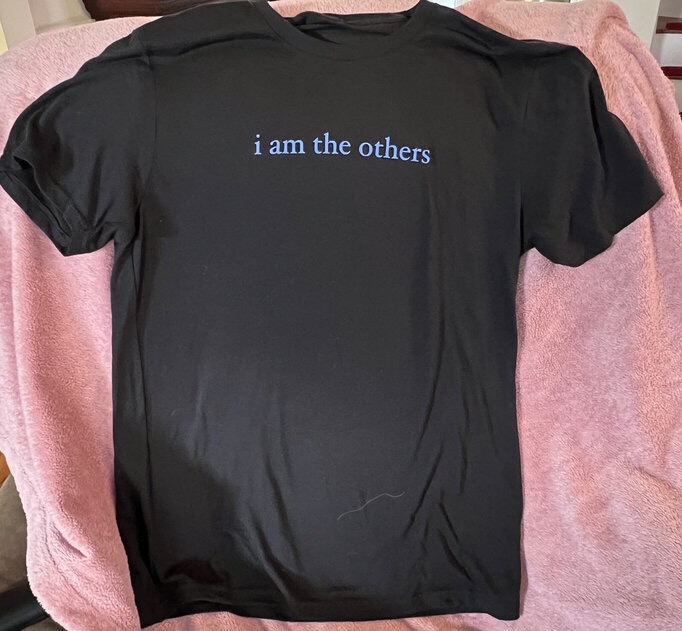
March 6, 2024
Transgressions

It had to happen sooner or later, because it hadn’t happened in more than a year, but my pool has closed “until further notice” due to a light falling from the ceiling and smashing on the pool deck, shards of glass in the pool which now needs to be drained, etc. etc. And instead of having a complete nervous breakdown like I did when the pool had to close for a few weeks in 2022 (I blame it on a period of precarious mental health and having recently read The Swimmers, by Julia Otsuka), I am being stoic and patient (okay, it’s only been 16 hours, but I’m hanging in there) and taking the bus to the community centre at Wellesley and Sherbourne to swim in the pool there, which is a great pool, but the point of this story is that has a universal/non-gendered change room. Which, when I used the pool previously, has been absolutely a non-story, and I actually appreciate the non-gendered aspect as opposed to my usual pool where people lie down naked in the steam room with their legs wide opened so I can LITERALLY see right up their butt holes. All butt-holes must be covered in the non-gendered change room, where we get changed in private stalls and everyone is required to be attired. But the other times when I’ve used this change room, it’s been the only change room available, by which I mean that there are actually two change rooms, but only one was open at a time. Today, however, both change rooms were open, and I felt slightly uncomfortable for being in an unfamiliar space where I’m not clear on routines and rituals, so I just tried to look cool and went into the change room before me. Except that everyone I encountered in the change room was a man. Now, this pool, for various demographic reasons, has way more men than women anyway, but I couldn’t help but wonder if I’d missed something and entered a men’s change room by mistake. And the whole point of all of this was JUST HOW MORTIFIED/EMBARRASSED/WEIRD I felt about potentially having done such a thing. How it tapped into something ancient inside of me that’s always been afraid of transgression, being in the wrong space, being the wrong body in the wrong space. Something ancient that doesn’t actually come up so often because inhabiting traditionally male spaces (like when I played the trombone instead of the flute, was loud instead of demure, used to get ridiculously drunk at the Pig’s Ear Tavern) has always been kind of awesome and empowering (I’ve long worshipped at the altar of Jo Polniaczek) but this was terrible and shameful for reasons I’m still not finished unpacking, and it was fascinating to experience this discomfort (as well as unpleasant). What a prison gender truly is in all kinds of ways I’m not even cognizant of.
February 28, 2024
Leaps
There is reference to an act of suicide in this post, which might not be okay for you right now. Please take care. And no, it’s not mine, Mom. I am fine 😉
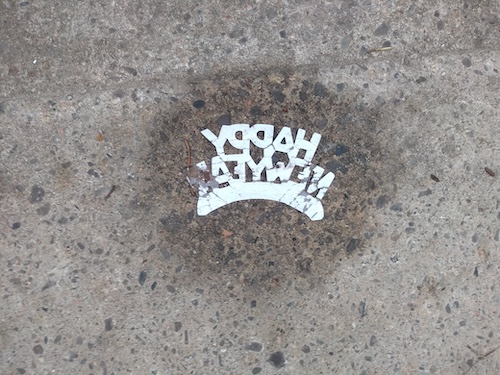
I like the idea of leap years, a bonus day, even if it happens to fall in February, 24 hours out of nothing with which I am welcome to use however I like (probably reading). But then the last time we had a leap year was, um, erm, 4 years ago, which was THAT YEAR, and I’ve always been a little bit superstitious, but THAT YEAR wrecked me (and everyone), and navigating the p.t.s.d. from that experience will likely be the project of the rest of my life.
What I’m trying to say is that I’ve been wanting to read this book called End Times, which has been sitting on my shelf for a while, but I haven’t, because in February 2020, I read a book from the same publisher called The Towers of Babylon that had some “end times” apocalyptic vibes, and I’m worried that if a pattern emerges, I might trigger disaster all over again. Sounds normal, right?
Two years later, I’d be (nearly literally?) out of my mind after a lifetime in pandemic years, the chaos of the trucker convoys, and the onslaught of invasion in Ukraine, and I remember eating dinner in a pizza restaurant as the TV news reported attacks on Ukrainian nuclear reactors, and I was so deeply entrenched in the catastrophic thinking that nearly wrecked me and convinced that we were all going to die, imminently, and I didn’t understand how everyone was acting normal. This was around the same time that I was waiting at a red light on Bathurst Street when something crashed down from a tall building under construction, and it wasn’t until long after I’d driven through those lights, until a few days later when I was reading the news, that I learned it had been a person who’d fallen to the street that day. Who’d jumped. Who’d leapt.
I feel like February is a rutted driveway, and I keep returning to those same tire tracks, noting the different designs of the treads, the shapes and patterns they make.
It was around this time of year, 11 years ago, that a very large cyst emerged in my thyroid, when I was seven months pregnant with my youngest child. And while I was far less practised in catastrophic thinking at that point, I’m still me, so I went straight there, to the small percentage of thyroid lumps that turn out to be malignant, and the tiny percentage of those malignant lumps that turn out to be fatal, which was a devastating diagnosis to receive from myself, obviously. But it turns out that I’m not even a doctor, and that sometimes weird and disturbing things can happen that don’t necessarily lead to the end of the world, which has been an important education for me. I really had no idea.
But even still! The magical thinking. I went for my annual thyroid check last week, and my thyroid is forever in flux, some lumps growing smaller, new ones emerging, which is not actually so rare for thyroids, and all of this change beneath the surface that I’d not even be aware of had that cyst not flared up all those years ago, placing me under watch. And my tests were all fine, once again, and I knew they’d be fine, that they’d probably be fine, but I felt even to say so might be a trick, lulling me into complacency. It’s just when give up on your guard that they get you, so my ever present anxiety whispers in my ear.
Deadly viruses. Fascism. Bodies falling from the sky. Lumps beneath the surface. The creative leaps my mind makes to suppose I might have control over any of this, over the universe at all. That the patterns are even there, signs and omens. I still can’t believe I wrote a blog post on February 21, 2020 about how, after five years of anxiety, I was finally learning how to be calm. Naturally, I am still not convinced that my blog post didn’t start the pandemic, in conjunction with that Babylon book, never mind that Covid-19 (which the blog post doesn’t even mention among all the other things I was worried about four years ago, and what if the problem was that I’d failed to watch out for it!?) had been circulating for months by then. But then the whole point of this is my inability to accept that the world exists outside of my mind.
January 8, 2024
One Hand in My Pocket
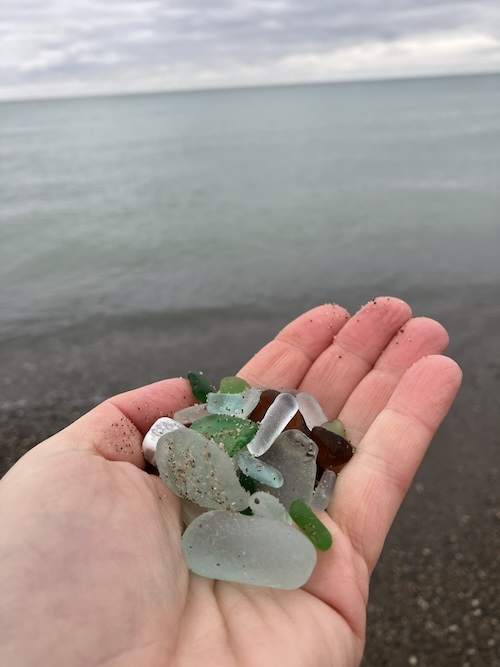
I’ve been thinking a lot about Shawna Lemay’s New Year’s post, “Learning to Be Of Two Minds,” mostly because my own personal 2024 quest (which is to be more human) involves precisely that, I think—even if I also struggle with this sense that I possibly might not know my own mind, the voice in my head consistently taking down any coherent narrative I’m offering it, which is exhausting, flip-floppy, though maybe the problem is that I’ve not learned to be of two minds, but rather my two minds are forever in conflict, which is something I need to resolve, to learn to let those two minds be.
Shawna’s post (which quotes Alanis Morissette and Marilynne Robinson) spoke to me in two (of course!) central ways, both creatively stimulating. First, it made me realize that the title of the novel which I’m working to have a new completed draft of by the end of the month needs to be titled ONE HAND IN MY POCKET. Why? Because it’s about a character whose life is a work in progress, a woman for whom it all comes down to that she “hasn’t got it all figured out just yet.”
And second, because of how the idea of having one hand in my pocket (as well as not having it all figured out just yet) really speaks to me in terms of where I’m at personally, and creatively. I feel like I’ve spend the last 10+ years showing all my cards, sharing my process, all the time, and that kind of openness has become unsatisfying.
In a piece in The Toronto Star this week (promoting her new book Let It Go), author Chelene Knight writes: “When I share something painful or heavy, I ask myself what I need in return and ensure I share my pain in spaces where I can receive what I need. I’m grateful for my intentional community. This is why social media is more of a highlight reel for me — the online world doesn’t get to have both my joy and my pain; they receive only the pieces I’m willing to give away because it’s unlikely I’ll get back what I need. But sadly, we don’t always consider social media as an intentional exchange.”
In 2024, I want to be more thoughtful about such transactions, and keep more things—more the joy and the pain—just for me, and the people in my life. Which is to say, I want to keep one hand in my pocket (and the other one is giving a high five. Or gathering sea glass. Probably not flicking a cigarette).
January 2, 2024
Returning to Myself
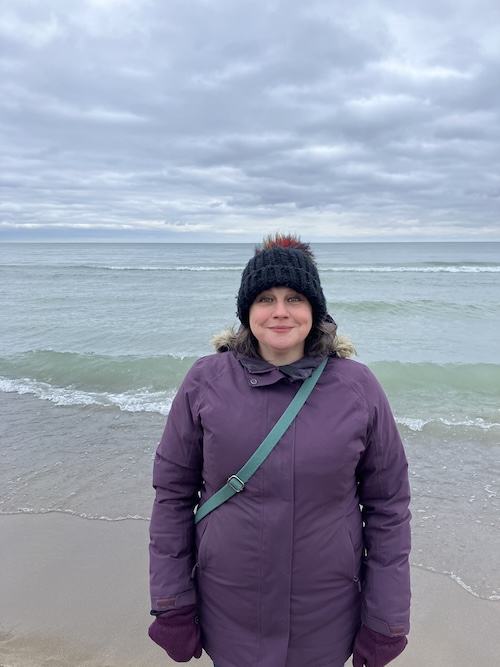
Something I’m grateful for is the way that selfies and Instagram have taught me to make friends with my face, with my appearance, which is no small thing when you’re a woman in your mid-40s (and I kind of wished I’d been able to do as much when I was youthful and 600% gorgeous but had no idea of the latter). For a very long time, I’d see pictures of my self and feel bad about not looking the way I thought I looked in my head. But once selfies became a thing, the face in the photo became familiar, somebody I recognized, even if she looked a little bit odd or the light was unflattering, but who doesn’t look odd, sometimes? How tedious to be the woman who freaks out about appearing in photos with the same face she walks around in the world with all the time.
There was also so much that was gratifying about Instagram’s algorithm’s favouring of faces, and bodies. The whole matter feeling particularly subversive since my face and body defy conventional beauty standards in some ways, and so I’d get to celebrate myself, to feel empowered and good inside my own skin, as though I was the one making the rules instead of catering to somebody else’s standard, and I was, I think, for a while.
Or maybe I never was, I don’t know. What I do know, however, is that at some point it started to feel not good. That whenever I needed the dopamine hit of engagement with my posts, I’d post a photo of my face, and the LIKES would start coming. And is that any way to treat my friend? Something that started off feeling empowering and meaningful becoming a cheap kind of gesture, and I became conscious of that. I became conscious of everything, this performance of my self, my life, my tea cups, even. I did not like it anymore.
Instagram wasn’t a performance, in the beginning. Or if it was, I didn’t notice, because it was serving me, and the LIKES came easily, so I didn’t have to think of them. (There were never so many, but numbers aren’t the kind of data my mind clings to.) I’ve spent the last 23 years putting elements of my life on the internet, and so social media feels natural to me, and I’ve always been able to use it in my own way, creating my own template instead of contorting myself in order to fit into somebody else’s, which is part of the reason why I’ll always be obscure, but it’s also entirely the reason I’m still here.
But last fall, it stopped feeling good to me. Partly it was became I was working so hard to try to sell my book (which is to say, to try to sell myself) and the book wasn’t selling. And—not unrelated—I was stuck in a rut in general, doing all these things both in my actual life and on the internet simply because these were things I always did, and while it’s true that rituals add meaning to existence, it’s possible to ritual so much that the life gets sucked out of them. The small ceremony of #TodaysTeacup began to feel rote. Posting my face began to feel rote. And then, even worse, I was doing all these things by rote and getting less engagement than I’d ever seen before, and it made me feel really bad about myself and about everything, and what even is the point of that?
Last year I struggled a lot to feel present in the moment. I think a lot of it was anticipation about my book release, so much set upon that event that every moment before it just felt like counting down the days. In the summer I swam to the middle of the lake in my favourite place in the whole world, and it just didn’t feel like my head was there, which was terrible since immersion in that lake, in that moment, in any moment, really, is so essential to my mental health. Similar to Instagram, it felt I was performing my experience, doing the things I do because these are the things I do, rather than consciously deliberately doing them.
By mid-December, I was pretty miserable. I actually diagnosed myself with a low grade depression, but I think I was just getting my period. Or maybe I was actually depressed after all, but getting off Instagram did the trick of fixing what was ailing me. Instantaneously. I think I’d been exhausted from the effort of trying to promote my book inside my little sphere of influence, like a crazy maniacal tap-dance that absolutely no one on the planet cared about, and once I got to stop dancing, it felt like such a relief. No longer scrolling past everybody else’s literary end-of-year triumphs, all the while my novel hadn’t garnered a single review. (And yes, I know that there are many writers who’d be grateful for the opportunity/exposure/sales I’ve been lucky to have, which is part of the reason talking about this at all is hard, but…that’s not the point?). Being able to just take a mug down from the cupboard without thinking about it. Heading out with friends and family and not taking a single photo, or if I did, not showing it to anybody. Noticing something beautiful, and not needing to share that beauty in order for it to true. Merely living a day, instead of feeling like I had to document it—and there was nothing mere about it. It was so restorative, and meaningful, and felt like I’d got a part of my life back that was only just for me.
And this is what I’m hoping of more of in this new year, to return to myself, to connect with the moment, to live more offline, and live differently on it. To spend less of my time striving for external validation (so much of which is superficial) and more time doing things that are meaningful to me.
April 24, 2023
There Was a Good Man Named Paul Revere
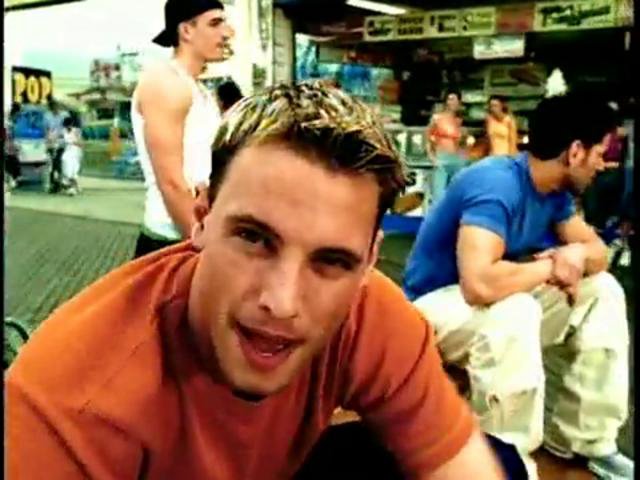
On Friday evening, a raccoon got into my kitchen. (Not for the first time; also this was not the only raccoon intruder in the neighbourhood this weekend!). And whenever I told anyone about it, they’d ask how the raccoon got in, and I would reply, “It came in the door…” And then I’d have to resist the impulse to finish off the sentence with, “I said it before/ I think I’m over you, but I’m really not sure.” Which is a problem much more rare than Toronto raccoons are, which is that I am absolutely obsessed with the song “Summer Girls,” by LFO.
And the weird thing about this is that everyone else isn’t. I don’t get it. A few years ago, back when Twitter was not a terrible place, I shared my shocking discovery that two out of the three members of LFO (aka, “The Lyte Funky Ones,” whose “Summer Girls” was pretty much a one-hit-wonder in 1999, though they tried hard to follow it up) had died of cancer. Because what kind of a statistic is that? Cancer, robbing the world of 66% of the ones who were lyte and funky, and now there is just one. The Lyte Funky ONE, and I partook in such banter with exactly TWO people, and it seemed like nobody else on Twitter cared about LFO, or even remembered the song at all.
But the lyrics to that song are wired to my brain in a way that I just can’t kick, and I don’t even want to. Which is kind of ridiculous, because the lyrics are so random and weird, but unbelievably catchy, and I just can’t help walking around the house muttering lines like, “Call you up, but what’s the use?/ I like Kevin Bacon, but I hate Footloose.”
Part of the problem is that I have two amazing daughters, and so it comes up a lot, a line like, “You’re the best girl that I ever did see.” Multiple times a day, I’m not even kidding, to which my children reply, without missing a beat, “The great Larry Bird, Jersey 33!” And HOW can I not follow that up with, “When you take a sip, you buzz like a hornet, Billy Shakespeare wrote a whole lot of sonnets”? Not a single one of which I can recite, by the way, and yet I know all the words to this bizarre and remarkably song in which “hornet” and “sonnet” rhyme!
When I do online yoga classes, I’m sometimes instructed to “shake and wiggle,” which puts “Summer Girls” back in my head yet again...as if it even needed planting: “In the summertime, girls got it goin’ on/ Shake and wiggle to a hip hop song.”
And I don’t know a better expression of love than telling somebody, “There was a good man named Paul Revere/ I feel much better, baby, when you’re near.”
Stayed all summer, then went back home
Macaulay Culkin wasn’t home alone
Fell deep in love, but now we ain’t speakin’
Michael J. Fox was Alex P. Keaton
I honestly don’t understand why any other song has to exist!
I am not the only person who has thought quite extensively about this song, and Rob Harvilla “How ‘Summer Girls’ Explains a Bunch of Hits—and the Music of 1999” was such a joy to encounter, explaining a lot about just how this song has been running through my brain for almost 25 years. (The summer of 1999 was one of the most vivid and insane periods of my life, and I remember every song that was ever on the radio, which was this one, and “I Want it That Way,” by the Backstreet Boys, and “Living’ La Vida Loca,” and “If You Had My Love,” my Jennifer Lopez, and and and, and Harvilla does a formidable job summing up the absolutely bananas musical year that ’99 was.)
I had never heard of Abercrombie and Fitch until that song, whose video had a similar vibe to “Steal My Sunshine,” by Len, and we all watched videos then, and I put my hair in cute pigtails and wore tank tops and aspired to be admired by boys with frosted tips.
One day I’m going to be old and senile, and just repeating these lyrics on a loop.
Boogaloo Shrimp and pogo sticks
My mind takes me back there oh so quick..





